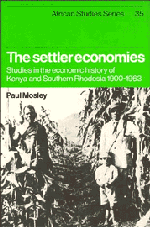Book contents
- Frontmatter
- Contents
- List of maps
- List of tables
- List of figures
- Preface
- A note on currency
- Abbreviations
- Kenya and Southern Rhodesia: principal place names
- 1 Introduction
- 2 The political constraints on economic behaviour
- 3 African agricultural development
- 4 The labour market
- 5 European agriculture
- 6 Secondary industry
- 7 Conclusions
- Notes
- Bibliography
- Index
- Frontmatter
- Contents
- List of maps
- List of tables
- List of figures
- Preface
- A note on currency
- Abbreviations
- Kenya and Southern Rhodesia: principal place names
- 1 Introduction
- 2 The political constraints on economic behaviour
- 3 African agricultural development
- 4 The labour market
- 5 European agriculture
- 6 Secondary industry
- 7 Conclusions
- Notes
- Bibliography
- Index
Summary
SCOPE AND METHODS
‘Settler colonialism’, as practised in this century in countries such as Kenya, Southern Rhodesia, Algeria and South Africa, is a rather odd phenomenon: it throws out a challenge, by its very existence, to both the apologist for colonialism and to the ‘underdevelopment theorist’. The former must come to terms with the restrictions placed on many parts of the indigenous economy in spite of the presence of a colonial administration nominally exercising ‘trusteeship’; the latter must face the fact that settler economies quickly develop an economic nationalism of their own and to that extent fail to fit the classical-imperialist model of underdeveloped countries whose economic policy and development are dictated by the needs of the European metropolis. In the last ten years, a large quantity of archive-based work has vastly increased our knowledge of such ‘settler economies’, in particular the two studied here. But in fact most of this work consists of studies by historians of policy-making, since this is what the archives give most information about. By their very nature, such studies cannot shed any light on the development of the economy; this is often left to be inferred from a description of policy measures, rather than explicitly examined. Only the labour market has been at all intensively studied by economists on a time-series basis, and even there, the data base before 1945 is alarmingly weak.
- Type
- Chapter
- Information
- The Settler EconomiesStudies in the Economic History of Kenya and Southern Rhodesia 1900–1963, pp. 1 - 9Publisher: Cambridge University PressPrint publication year: 1983



